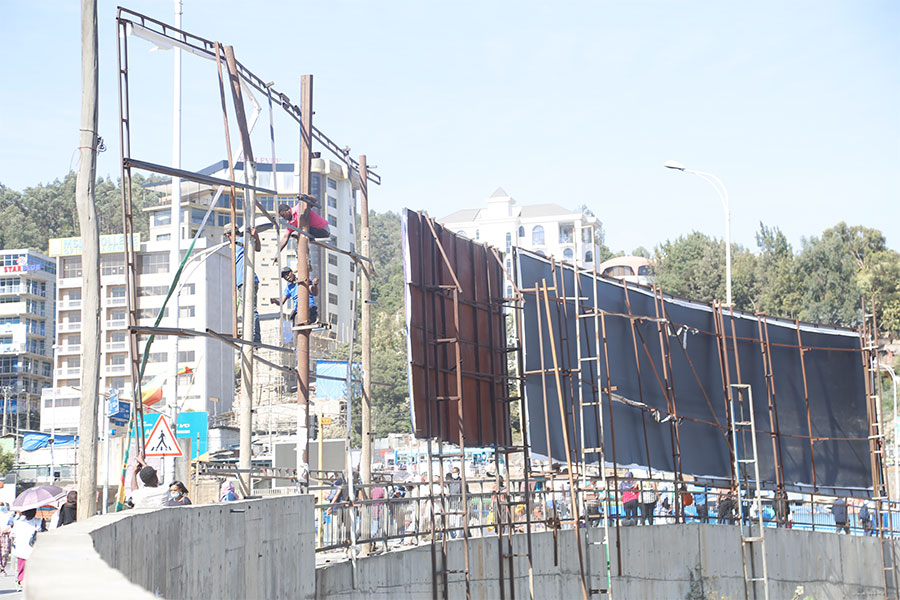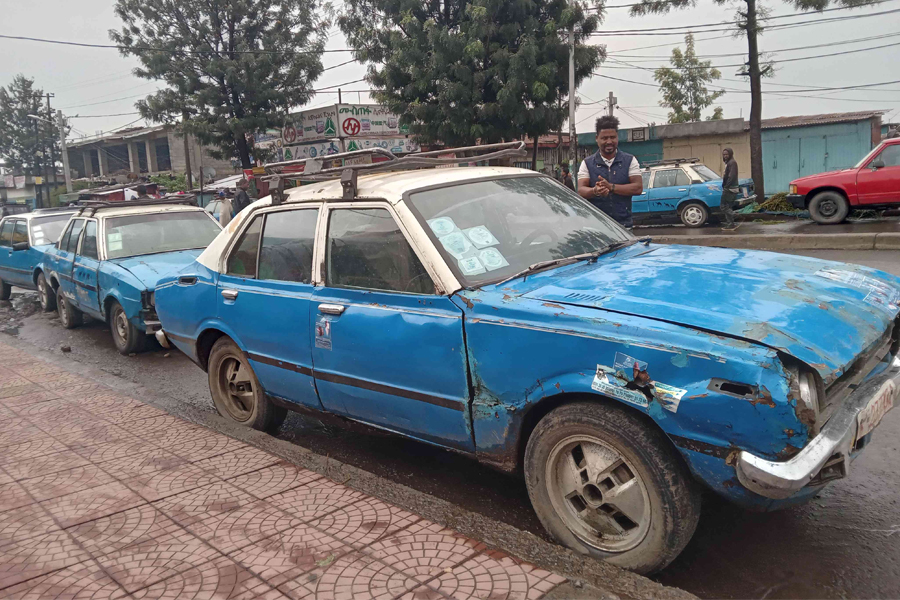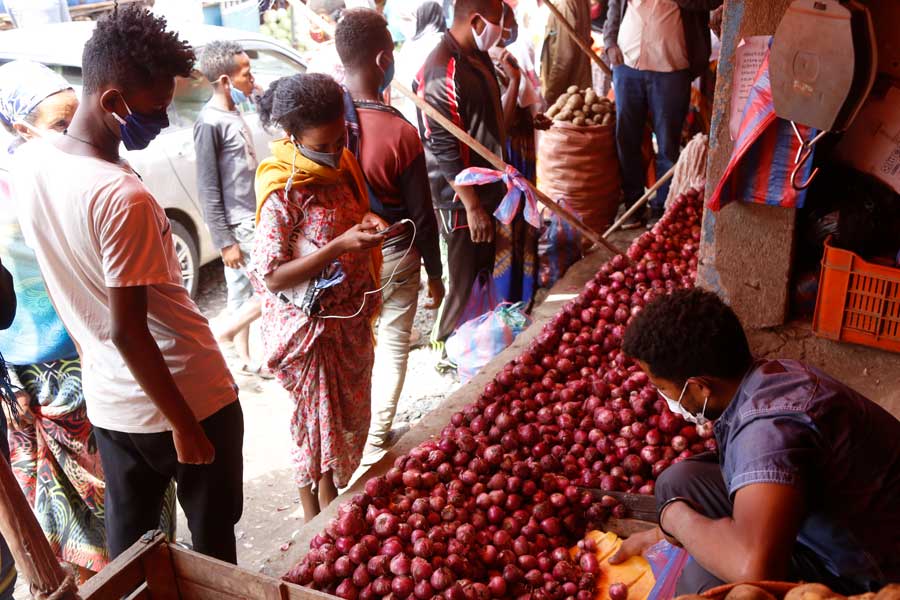
Radar | Feb 05,2022
The federal government is preparing to incorporate farmlands located in the peripheries of Addis Abeba under the urban cadastre system, amending an eight-year-old law that governs urban landholding registration. Officials hope the move will serve as an antidote to a controversial issue that has been at the forefront since 2014.
A widespread perception that the federal government had plans to expand the capital into the surrounding farmland ignited violent protests since 2016, threatening to engulf the country in chaos.
A cadastral map displays the boundaries and holdings of land parcels and registers the real estate of a given area. The system has two components. The Real Estate Cadastral System computes the coordinates of a land parcel and enables the merging and splitting of parcels in the interest of leaseholders. The Real Estate Property Registration System, where authorities register information related to lease-holding such as legal registration, name transfer and mortgage documents.
The amendment introduces a uniform urban land management system, according to Aragie Kibret, director of communications at the Federal Urban Land & Land Related Property Registry & Information Agency.
The Agency is soon to subordinate itself to the Ministry of Urban Development & Infrastructure.
The bill, which amends the existing urban landholding registration proclamation, proposes urban land parcels, including farmlands, are mapped and demarcated through aerial photography and ground surveys. The current regime does not recognise the capital's farmlands, putting the landowners in a precarious position. A lack of documentation proving ownership has meant that farmers in these areas receive little in the way of compensation if their land is taken by eminent domain for development purposes.
Around 70,000 farming households reside within the capital's peripheries, mainly in the Bole, Yeka and Akaki districts, according to a 2017 report from UN-Habitat.
Thousands of farmers in the peripheries of Addis Abeba have been displaced since a renewal programme for the urban land regime was launched two decades ago to make room for public projects such as condominium housing. According to the report, between the mid-1990s and 2016, close to 32,000 farmers in five districts have been displaced due to infrastructure development, public housing, and transportation projects.
One such area is in the Nifas-Silk Lafto District. The condominium complex constructed in an area known as Jemo, one of the largest housing projects in the city, is split into three zones incorporating over 10,000 units.
Yilma Gemachu, 76, is a farmer who lives with his six children in Jemo. He was forced to surrender 3.5ht of land for the public housing project a decade ago. He now lives in a two-bedroom housing 1.5Km away from the farmland he had inherited from his father. It has since shrunk down to half a hectare.
“I gave up my land,” Yilma told Fortune. “The compensation I had received was nothing compared to the land I lost.”
Yilma was paid 3.75 Br a square metre (112,500 Br in total) for his lost land. He still depends on what little he has left, farming up to five quintals of teff each year.
According to Aragie, the amendment will help protect the rights of farmer like Yilma to land use by availing a complete cadastral map and an improved documentation process.
“The bill allows farmers to register their farmland into the cadastre system," he said. "They can sell their property based on market prices."
Under the law, farmers cannot sell user rights of plots or transfer them in the form of inheritance, for they do not possess title deeds.
Endashaw Berhanu, 61, a father of four who lives in Jemo, inherited eight hectares of land 45 years ago. Barring the receipts he received for paying annual tax on his farmland, he has no documents to prove the land belongs to him. However, Endashaw has less than a third of his initial holdings left after surrendering the rest to housing development. He received around 100,000 Br in compensation.
Aragie pledges the bill will improve farmers' compensation when they hand over land for development.
Despite the pledge, experts see the registration, updating and implementing parcels of farmland surrounding the capital will be a thorny task.
According to Arba Beyene, a legal expert who worked at the Yeka District Land Management Bureau for three years, it isn't easy to demarcate farmlands.
"There is no prior documentation as these holdings are not included in the official land registry system,” said Arba.
He urges officials to focus on determining the boundaries of Addis Abeba before doing anything else. This is essential to identify which farmlands should be included in the cadastre system, according to the expert. Aragie concedes that there is still no official consensus about the capital's boundaries but contends the amendment will be a valuable tool in ending illegal urban landholding.
This is also something that has Yilma concerned.
“Illegal squatters are fencing more and more land every day,” he said.
Farmers like Endashaw are more worried about the capital's sustained expansion.
“I don’t know how long I can stay here,” said Endashaw.
While Endashaw and Yilma remain uncertain about their future, officials at the Agency are optimistic the Council of Ministers will forward the bill to parliament for approval. It has been eight months since the bill was sent to the Council.
PUBLISHED ON
[ VOL
, NO
]

Radar | Feb 05,2022

Fortune News | Jun 08,2024

Fortune News | Oct 27,2024

Fortune News | Jul 22,2023

Verbatim | Dec 11,2020

Agenda | Jun 20,2020

Radar | Apr 30,2024

Viewpoints | Jul 08,2023

Commentaries | Apr 26,2025

Viewpoints | Apr 30,2022

Dec 22 , 2024 . By TIZITA SHEWAFERAW
Charged with transforming colossal state-owned enterprises into modern and competitiv...

Aug 18 , 2024 . By AKSAH ITALO
Although predictable Yonas Zerihun's job in the ride-hailing service is not immune to...

Jul 28 , 2024 . By TIZITA SHEWAFERAW
Unhabitual, perhaps too many, Samuel Gebreyohannes, 38, used to occasionally enjoy a couple of beers at breakfast. However, he recently swit...

Jul 13 , 2024 . By AKSAH ITALO
Investors who rely on tractors, trucks, and field vehicles for commuting, transporting commodities, and f...

Jul 5 , 2025
Six years ago, Ethiopia was the darling of international liberal commentators. A year...

Jun 28 , 2025
Meseret Damtie, the assertive auditor general, has never been shy about naming names...

Jun 21 , 2025
A well-worn adage says, “Budget is not destiny, but it is direction.” Examining t...

Jun 14 , 2025
Yet again, the Horn of Africa is bracing for trouble. A region already frayed by wars...